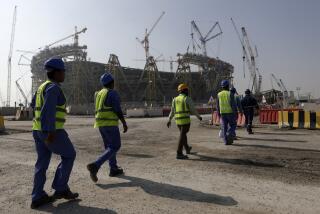WORLD CUP : Soccer, Tradition Are Colliding in Italy
- Share via
ROME — Italy has had four years to prepare for the World Cup, but with soccer’s showcase event just six months away cranes are still in place, roads are torn up, new rail lines are incomplete and only four of the 12 stadiums are finished.
And to make matters worse, unions are complaining that the work is being speeded up, blaming haste in part for 12 deaths at World Cup construction projects.
Criminal investigators are examining some of the construction contracts and soaring costs of the projects and environmentalists are trying to stop some of the work.
Still, the Italian Organizing Committee is confident the work will be completed, the tournament played and all on time.
Italians live with chaos, seem almost to thrive on it. They cope with it daily in their snarled traffic and baffling bureaucracy. The organizers do not seem surprised to find it in the preparations for the World Cup.
“You see Italy is going to be in the eyes of the world, so we cannot fail,” said organizing committee spokesman Adriano Botta. “By the time we have the World Cup we will have 12 of the most modern stadiums in Europe for the next 20 years.”
But others say they are worried because of the attention focused on Italy.
“May is the deadline, but we are sure that it won’t be met. We will be showing Italy from its worst side,” said Anna Maria Procacci, a member of Parliament from the environmentalist Greens Party, which has been a vocal critic of World Cup preparations.
Construction is scheduled to be completed at stadiums in Bari, Turin, Cagliari and Milan by the end of the year, in Palermo by Feb. 28 and in Naples and Florence by the end of March. The stadiums in Bari and Turin are brand new.
Rome’s deadline is not until May 30, just eight days before the tournament kicks off. Work on the stadium, which was built for the 1960 Summer Olympics, includes lowering the playing field, putting in new seats and building a roof to shelter the spectators.
The July 8 final is scheduled for the Rome stadium.
“Realize that if you decide to do it at the last moment, which is usual in Italy, it means the costs are going to be higher and more people are going to make more money,” said Botta, referring to costs for overtime and last-minute revisions.
Stadium costs have soared from original estimates. In Rome, for example, work once estimated at $59.2 million is now expected to cost more than $118.4 million.
“Huge amounts of money are being spent for public works that we think are perfectly useless,” said Procacci. “Some people want to take advantage of the Italians’ passion for soccer.”
Organizing Committee chairman Luca Montezemolo has spoken often over the past few months about Italy’s “missed opportunities,” about the public works projects that have been delayed or abandoned while politicians procrastinated and squabbled over money.
Still, he and others in the committee have insisted the stadiums will be ready.
But Procacci and some union officials complain about a haste to build the stadiums that has led to work around the clock and an ignoring of safety regulations.
Nine of the 12 accidental deaths at World Cup construction projects happened in the stadiums.
“Unfortunately, this is part of the way of life in this country . . . to avoid the issue in order to rush everything at the last moment,” said Angelo Gallo, a union official in Palermo where five workers were killed in a single accident last August.
“If one had only considered this problem a little earlier, there would surely have been less deaths,” he charged.
Botta acknowledged the problems, but he pointed out that the cities and not the organizing committee are responsible for the construction and for the awarding of contracts. He also defended tournament organizers from accusations in the press that the World Cup was responsible for the haste and the deaths.
“They said, ‘Oh, the World Cup is full of blood.’ But it is not the World Cup,” said Botta.
“First of all, you have to realize how Italy is governed,” said Botta, noting that the city government in Turin has changed four times in the last three years.
“You see on one side you have an Italy which is knowledge, which is capacity--technological capacity with all its modern equipment. On the other side we have a very old type of bureaucracy which in a way sort of mingles through these matters and there are delays,” he said.
More to Read
Go beyond the scoreboard
Get the latest on L.A.'s teams in the daily Sports Report newsletter.
You may occasionally receive promotional content from the Los Angeles Times.






